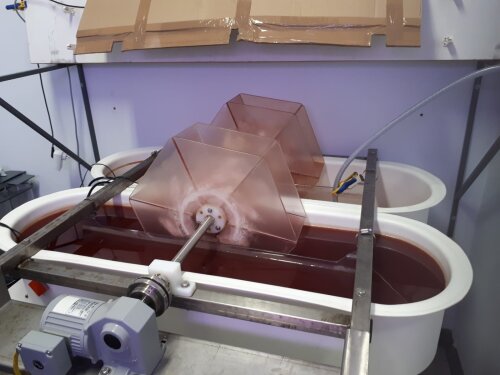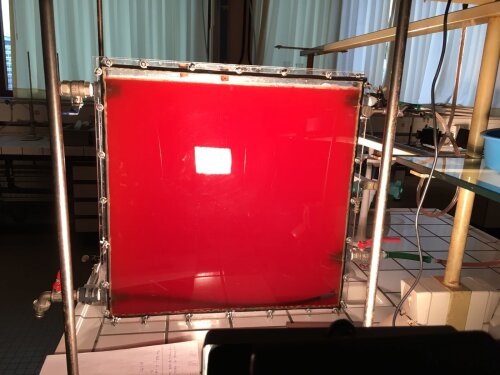Dutch Trappist brewery doubles as breeding ground for promising purple bacteria
Local, sustainable production of animal feed is becoming a reality. UAntwerp, UGent and the company SEMiLLA IPStar are cultivating purple bacteria in brewery wastewater for use as a protein source that makes shrimp grow faster. Microbial proteins can reduce both our environmental impact and our dependency on imported proteins such as fish meal and soybean meal.
Protein is an
essential component of all feed used in livestock farming and aquaculture. Huge
quantities of fish meal and soybean meal are produced to meet this protein
requirement. 'However, these sources of protein put a lot of pressure on the
environment', explains Siegfried Vlaeminck, Professor of Environmental
Technology in the Department of Bioscience Engineering at UAntwerp. 'The Amazon
forest is being cut down to free up farmland to grow crops such as soybeans.'
'And fish meal is problematic as well', says Gilbert Van Stappen, Professor of Aquaculture at UGent. 'Our natural fish reserves are in danger of being depleted, as about 30% of the world's marine fish stocks are being over-fished.'
In addition to the environmental issues, there is also an enormous economic dependence, with 60% and 40% of all soybean meal and fish meal being imported into the European Union respectively. This situation is not sustainable. Which is why the European Commission, through its Green Deal, is committed to making the transition to a sustainable society in which economic growth and a healthy environment go hand in hand. One of the spearheads of this plan is the Farm to Fork Strategy, which promotes the development and use of alternative sources of protein (e.g. from plants, insects and bacteria).

Protein from microbes?
'Microbes are an interesting source of protein because of their high growth rate, high protein content and low water consumption', says Siegfried Vlaeminck. Professor Vlaeminck's research team focuses mainly on the cultivation of bacteria in wastewater, which is actually full of useful nutrients. As the wastewater is purified, a usable microbial product is obtained: it's a win-win situation.
Dr Abbas Alloul, a postdoctoral research fellow at UAntwerp, performs research into purple bacteria. 'When these bacteria are grown in wastewater, they can contain up to 70% protein. This makes them extremely interesting as an alternative feed ingredient. And purple bacteria also contain vitamins and antioxidants.'
The company SEMiLLA IPStar and UAntwerp have joined forces to start producing purple bacteria in the wastewater of De Koningshoeven, a brewery in the Dutch province of North Brabant, where the famous Trappist beer La Trappe is brewed. 'In a 100-litre reactor, we're achieving a protein productivity of 120 tonnes per hectare per year. That’s very efficient compared to soybean farming, which only yields 1.5 tonnes of protein per hectare per year', explains Dr Alloul. According to Rob Suters at SEMiLLA IPStar, 'initiatives like these are crucial if we want to transition to a circular economy’.

Making shrimp grow faster
At both UAntwerp and UGent, tests have been carried out to determine whether these microbial proteins are good replacements for soybean and fish meal in shrimp feed. 'Our tests with purple bacteria showed that shrimp grew faster on microbial protein than on the standard feed', says Dr Alloul. The results were published in the scientific journal Aquaculture. The article also mentions that purple bacteria have favourable probiotic properties, inhibiting the growth of pathogenic bacteria. 'These pathogens are a major threat to shrimp farming', explains Peter Bossier, Professor of Aquaculture at UGent. 'Alternative control agents are urgently needed. The antibiotics used today actually contribute to the spread of these pathogens.'
What’s next?
The EU's Farm to Fork Strategy has certainly piqued interest in alternative proteins based on microbes. 'Several companies have already started commercial production', says Siegfried Vlaeminck. 'The production cost, which is often a decisive factor for use in animal feed, can certainly be brought down through more research.'
Prof. Vlaeminck conducts research at the Microbial Systems Technology (MST) Centre of Excellence, which was established at UAntwerp last year. Its mission is to explore the versatility of bacteria for a bio-based and sustainable economy. As regards purple bacteria in particular, the technology is being further optimised, while various avenues for commercialisation are being explored.
Want to know more about this research?
Contact Abbas Alloul
Publications
Alloul, A., Wille, M., Lucenti, P., Bossier, P., Van Stappen, G., & Vlaeminck, S. E. (2021). Purple bacteria as added-value protein ingredient in shrimp feed: Penaeus vannamei growth performance, and tolerance against Vibrio and ammonia stress. Aquaculture, 530, 735788. DOI: 10.1016/j.aquaculture.2020.735788
Alloul, A., Cerruti, M., Adamczyka, D., Weissbrodt, D. G., & Vlaeminck, S. E. (2020). Control tools to selectively produce purple bacteria for microbial protein in raceway reactors. bioRxiv. DOI: 10.1101/2020.01.20.912980